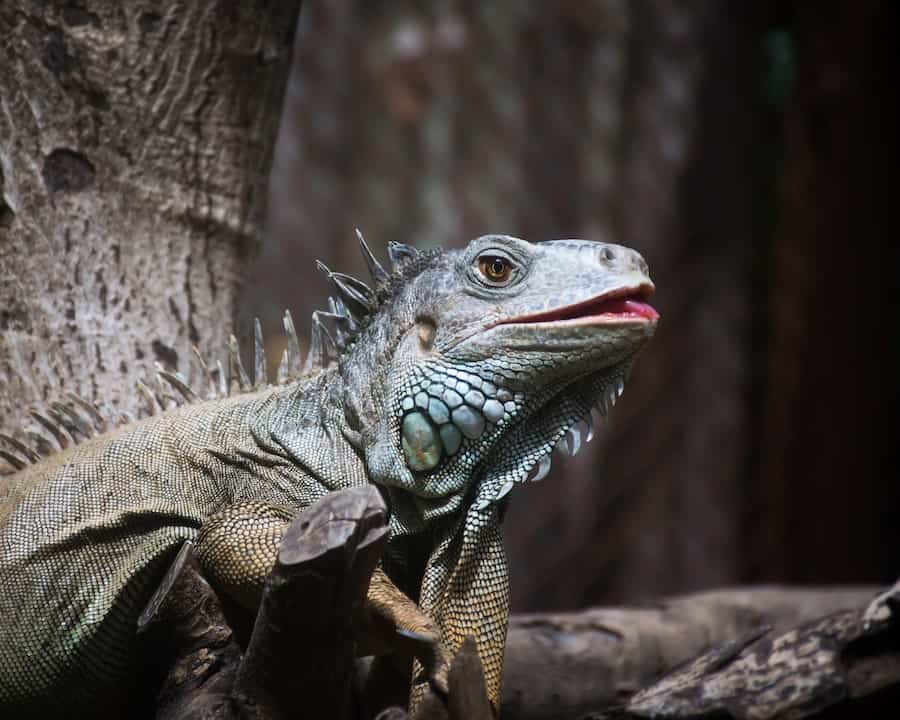Iguanas are susceptible to disease and illness. However, one concern I didn’t have until I owned an iguana was Salmonella. Can iguanas even get Salmonella?
Iguanas can get Salmonella, but the main risks and concerns are human-related. Handling your pet may be enough to transmit Salmonella to you or your friends and family.
If you want to keep your iguana happy and healthy, the points below will shed light on iguanas and Salmonella.
Do All Iguanas Carry Salmonella?

All iguanas can carry Salmonella. In fact, an interesting report found at least 20 different forms of Salmonella in iguanas. Your reptile carries Salmonella in its intestinal tract.
Reports suggest that a minimum of 90% of reptiles have some strain of intestinal bacteria, but your reptile doesn’t spread Salmonella all the time, either.
Instead, Salmonella is spread periodically through a process called “shedding.” The shedding occurs when the iguana goes to the bathroom and passes it through feces.
If your reptile isn’t eating and you’re concerned he might have Salmonella, I wrote a great article on this very topic titled “Top Reasons Why Your Iguana is Not Eating.”
Why do Iguanas Get Infected with Salmonella?

Salmonella comes from bacteria, but to understand how iguanas get infected, you must understand the breeding process.
Iguanas are one of the most common reptile pets in the world. People are clamoring for their own “mini dinosaurs.”
The problem is many iguanas are:
- Commercially bred
- Enter “reptile ranches”
- Get Salmonella while in the “ranch”
Breeders may hatch dozens of iguanas, but if one has Salmonella, there’s a very real risk the rest will also get it. There are also other iguanas which are caught in the wild that have Salmonella.
Anything a reptile touches can have Salmonella on it, including:
- Cages
- Enclosures
- Bowls
- Branches
Direct contact can cause reptiles to transfer Salmonella to one another. Additionally, Salmonella can and does often spread through feces.
Iguanas cannot wash themselves or their enclosure, so it’s up to owners to focus on cleanliness to reduce the risk of Salmonella.
Can Iguanas Die from Salmonella?

James Hatfield, author of “Green Iguana The Ultimate Owner’s Manual,” states that Salmonella doesn’t usually impact iguanas on page 417 (if you have the book. If you don’t I highly suggest buying it).
You may find some cases where an iguana is eating less and has Salmonella. However, most iguanas seem unaffected by Salmonella.
How to Cure Iguanas of Salmonella

VCA Animal Hospitals state that most treatment is unsuccessful in treating Salmonella in iguanas. However, there’s also no reason for concern that your iguana will be impacted by the bacteria.
Most iguanas who carry Salmonella are not:
- Ill
- Negatively impacted
Even with Salmonella, your iguana can expect to live a long, happy life. As of the time of writing this article, there’s little reason to be concerned if your iguana has Salmonella.
If you have an older reptile or one that has a known immune system deficiency, you’ll want to consult with your vet to learn if it’s a major concern or not.
Wondering how long iguanas live? I wrote an article on this very topic, titled “How Long Do Iguanas Live? Plus Tips to Increase Lifespan.”
Can Dogs and Cats Get Salmonella?
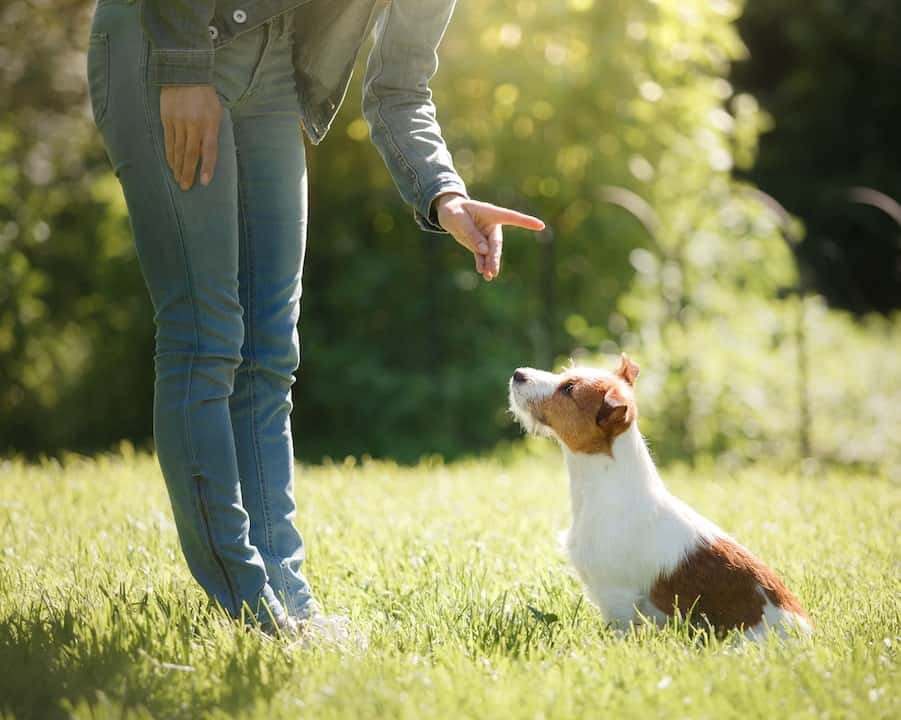
If you’re like a lot of reptile owners, you’re an animal lover, too. Cats and dogs can both get Salmonella. Contact with your iguana or its feces can cause infection.
Signs to be on the lookout for include:
- Diarrhea, which is common in both cats and dogs that carry the bacteria.
- Diarrhea may contain mucus or blood.
- Cats or dogs may have a higher rate of vomiting (common in cats).
- Loss of appetite or excess salivation is common in cats with Salmonella.
Your cat or dog may also have a fever, which is easy for most pet parents to overlook. Your pet may not have symptoms of Salmonella at all. If your iguana does have Salmonella, it’s a smart idea to have your other pets tested.
Can Dogs and Cats Die from Salmonella?
Unfortunately, both cats and dogs can die from Salmonella. Healthy, young pets have the best survival rates. With that said, if you have a pet who is a senior or has a compromised immune system, Salmonella can kill them.
Treating Salmonella is possible and best done under the supervision of your veterinarian.
A veterinarian may perform multiple treatments for your pet(s), including:
- Administer fluids
- Provide supportive care
- Administer antibiotics
In severe cases, your vet may recommend that your pet be hospitalized. Hospitalization allows your animal to receive the care and attention necessary to overcome Salmonella.
If you have any concerns that you or your cat or dog have Salmonella, a quick diagnosis and treatment offer the best chance of minimal complications.
Can Iguanas Transmit Salmonella to People?
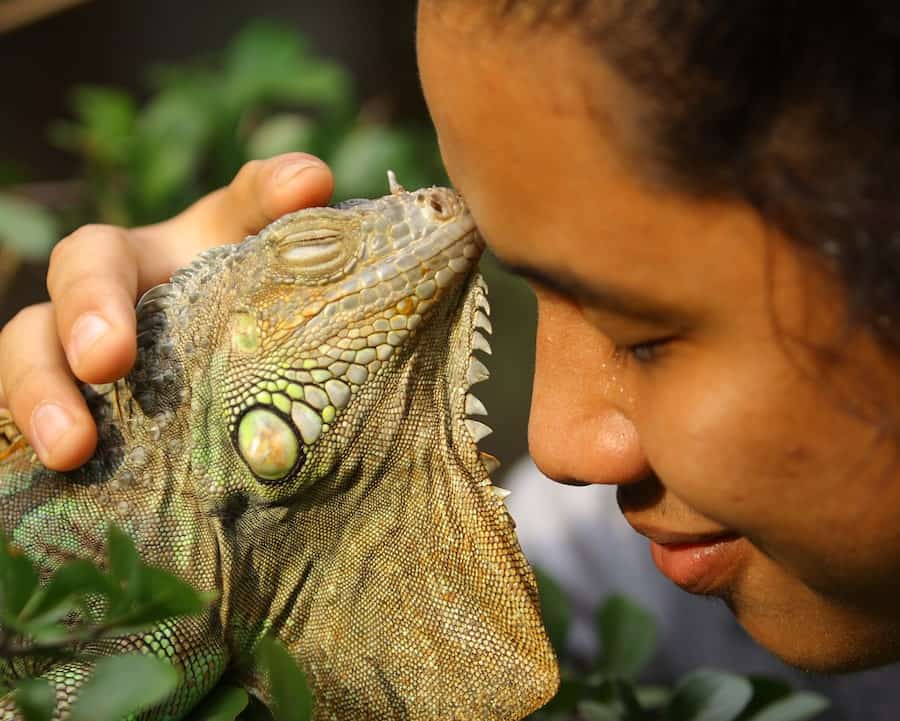
Yes. Unfortunately, you can get Salmonella from handling your iguana or coming in contact with his feces. As a reptile owner, you want to do everything in your power to avoid getting Salmonella.
The consequences can be dire if Salmonella is allowed to remain untreated.
If you want to protect your iguana, we’re going to share a lot of great tips in the section below titled “Tips to Protect Your iguana from Salmonella.”
However, if there’s one thing that you can do right now to prevent Salmonella, it’s to wash your hands.
Can People Die from Salmonella?
Salmonella is often found in the news due to recalls. Authorities will recall goods that have a risk of contamination because they can cause serious health problems.
Some people even die from Salmonella.
One report from 1996 outlines how a three-week-old child, Gaige Becker, likely contracted Salmonella from the family iguana. The baby died as a result, but many parents wouldn’t recognize the symptoms:
- Abdominal cramps
- Diarrhea
- Fever
Babies get diarrhea, so the family likely did not realize that there was a major cause for concern. The good news is that death from Salmonella is not common, although there are some groups at higher risk than others.
For example, those who have to be very cautious of Salmonella because of the high risk of death are:
- Babies who have immature immune systems
- Anyone who has a weakened immune system
- Elderly handlers with weakened immune systems
A person with a weakened immune system should seek treatment for Salmonella as soon as possible. You may want to avoid having an iguana if you fall into the above categories.
Salmonella is known for causing severe illness in these demographics.
What do I do if I Get Infected with Salmonella?
If you get infected with Salmonella, you will likely experience:
- Fever
- Diarrhea
- Stomach cramps
These are the most common symptoms of infection, and they typically appear within six days of exposure. Symptoms can last a week or more, and they can sometimes be severe.
Although rare, some people don’t experience any symptoms.
It’s important to get medical attention right away if you get infected or think you are infected with Salmonella. Many people recover without the need for antibiotics, but it’s important to consult your doctor for treatment advice.
An infection can cause severe dehydration. So, make sure that you drink plenty of water to replenish lost fluids and keep a close eye on your symptoms.
If the infection spreads beyond the intestines, the complications can be life-threatening.
Another important thing to do if you get infected with Salmonella is to re-evaluate the care routine for your iguana.
- Were you allowing your pet near food or where food is prepared?
- Did you disinfect the area after cleaning your iguana’s cage items?
- Were you cleaning your lizard’s enclosure daily?
Understanding how you may have become infected can help prevent future infections.
Caring for an iguana is a responsibility and one that requires a daily commitment to keeping their enclosure clean. Taking steps to prevent infection will help protect your entire family.
Tips to Protect Your Iguana From Salmonella

Prevention is one of the best ways to protect your iguana and your family from Salmonella, and proper hygiene plays a crucial role in keeping the disease under control.
Wash Your Hands After Handling or Cleaning Your Iguana
The best thing you can do to protect against Salmonella is to wash your hands after handling or cleaning your iguana.
The CDC recommends washing your hands after:
- Touching, handling or playing with your iguana
- Cleaning your pet’s enclosure
- Handling your iguana’s feces or items in its enclosure
- Feeding your iguana or handling its food
If you own an iguana, it’s generally a good idea to wash your hands before eating and drinking just to be safe.
If you don’t have access to soap and water, you can use hand sanitizer with at least 60% alcohol.
Keep Your Pet Away from Your Food and Your Kitchen
Because Salmonella can get onto your iguana’s skin, cages and other things they touch, it’s important to keep them away from your food and any areas where food is prepared.
As a general rule of thumb, you want to keep your iguana out of any area of your home where you may eat, serve, store or make food to reduce the risk of contamination.
Keep in mind that iguanas can jump, so it’s best to keep them out of the kitchen and off tables.
If you want to learn more about iguana jumping, I invite you to read a post I wrote titled “Can Iguanas Jump & What to Expect.”
Be Smart About Feeding
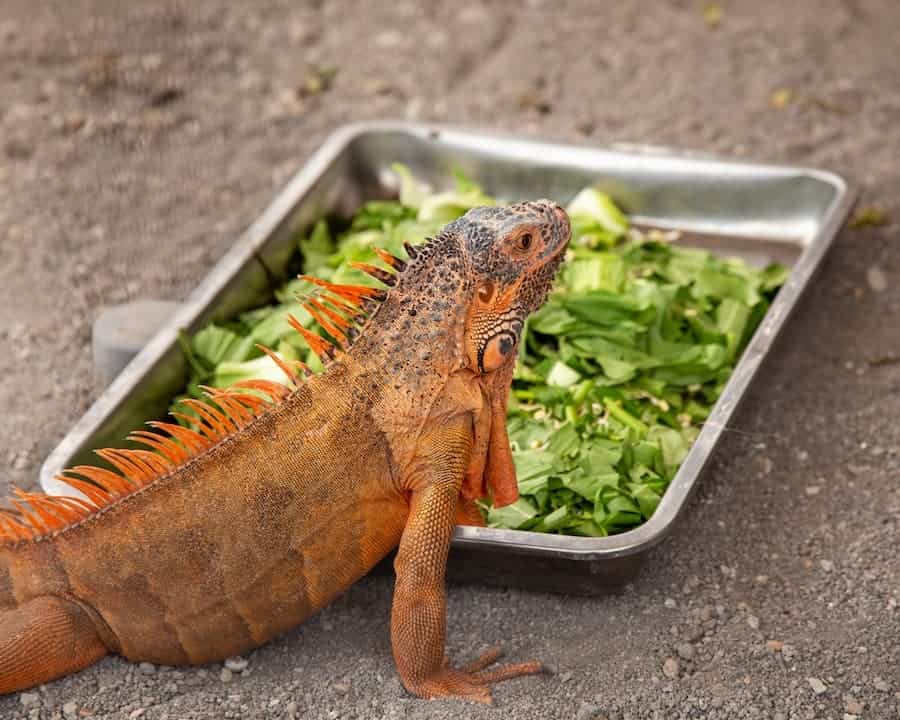
You may feed your iguana “human” food, but it’s still best to keep their food away from your food.
Remember that you’re going to be handling your pet’s food every day. Even if you wash your hands after feeding, there is always a risk of contamination if you do not separate their food from yours.
Use a designated container for storing your iguana’s food. Always make sure that you wash your hands and your iguana’s food container after feeding.
Don’t Allow Young Children to Handle the Iguana
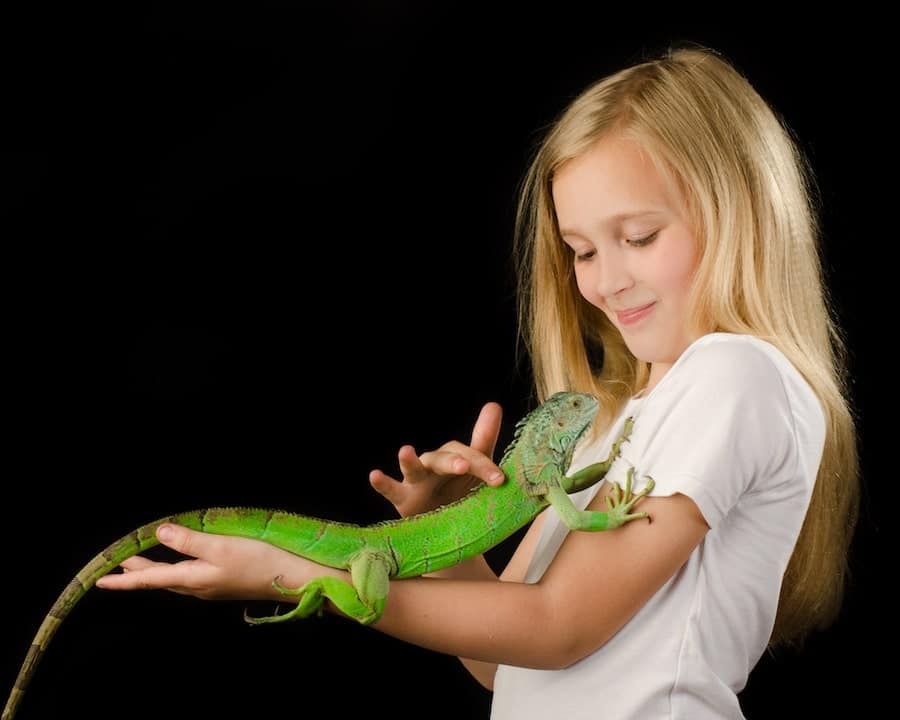
Children are at a higher risk of serious illness and hospitalization from Salmonella. When it comes to a child’s health, it’s always better to be safe than sorry.
Avoid having young children under the age of 5 handle or touch your iguana or its enclosure. Young children still have immature immune systems, which can make it harder to fight against Salmonella and other infections.
Limit Your Iguana’s Roaming

If you’re concerned about accidents and contamination, it’s best to limit your pet’s roaming around the house.
Create a designated area in your home for roaming and always supervise your iguana when it’s out of its enclosure.
If your pet does venture out, make sure that you disinfect the area to prevent contamination and infection.
Clean Your Iguana’s Feces Right Away

Iguanas shed Salmonella through their feces, so make sure that you’re cleaning up right away.
Removing your iguana’s poop will help prevent the bacteria from spreading onto its skin and items in its enclosure.
It’s also a good idea to remove any uneaten food, shed skin and other waste each day. Keeping your iguana’s enclosure clean will help stop the spread of Salmonella.
Clean Your Iguana in a Designated Area
Create a designated area for cleaning your iguana, its enclosure, equipment or anything related to your pet.
Do not clean any of your iguana’s equipment or your iguana in areas where food is prepared, served or eaten. In other words, don’t use your kitchen sink for cleaning.
If you’re going to clean your pet’s cage and food items in the bathroom, make sure that you disinfect the area afterward to prevent contamination and infection.
Following the tips above can help protect against Salmonella. Hygiene is crucial in keeping you and your family safe from infection.
Final Thoughts
Salmonella is a serious concern for iguana owners, and one that shouldn’t be taken lightly. While your lizard may not be affected by Salmonella, it can make you very ill.
Always wash your hands after handling your pet and disinfect any areas where your iguana roams to help prevent infection.

